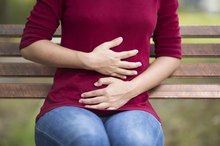Does Too Much Fiber Cause Stomach Cramps?
Fiber is a recommended part of a healthy diet. Getting the proper amount of fiber per day helps keep your digestion running smoothly and can help prevent constipation. If, however, you consume too much fiber in one sitting or add too much fiber to your diet too quickly, it can cause gas and cramping. Adjusting your dietary fiber intake can usually prevent stomach cramps. If it doesn't, taking a supplement to reduce the amount of gas in your intestines might offer relief. Stomach cramps that are severe or persistent should be treated by a doctor.
Dietary Fiber
Dietary fiber is found in all of the plant-based foods we consume, according to the University of Maryland Medical Center. Most of these foods contain a mixture of the two types of fiber, insoluble and soluble. Insoluble fiber -- found in foods like wheat bran, fruit peels and some vegetables -- doesn't dissolve in water and adds bulk to your stool, helping it pass more easily through your intestines. Soluble fiber, on the other hand, does dissolve in water and forms a gel-like stool, which helps slow your digestion. This prevents your stomach and intestines from absorbing too much sugar and starch, which can help control cholesterol levels and possibly help prevent stroke and heart disease. Soluble fiber is common in beans, bran, peas and the majority of fruits.
Fiber Problems
Watery Stool, Diarrhea, Gas, Bloating & Fiber in Food
Learn More
As fiber is not broken down in the stomach or small intestine, it gets passed to the large intestine, where bacteria go to work on breaking it down as much as they can. This process produces gas, which can be excessive if the bacteria in your system aren't used to breaking down the fiber. Adding a lot of fiber to your diet very quickly is a common cause of gas buildup. Eating too much fiber in one sitting can also have the same effect.
Possible Solutions
If you are just starting to increase the amount of fiber in your diet, gradually increase the amount of fiber you consume every day over a period of several weeks until you reach the required amount -- which is between 20 grams and 30 grams per day, according to the Harvard School of Public Health. This gives your body time to adjust, which can prevent cramping and gas. Avoid eating over the recommended amount of fiber per day once your body is adjusted to prevent further gas and cramping. If you take fiber supplements, be sure to drink 8 ounces of water to help prevent gas and constipation.
Other Consideratons
Benefiber Side Effects
Learn More
You might experience symptoms of cramping even after slowly adding the amount of fiber in your diet. If the cramping is mild, taking a supplement to reduce gas in your intestine may offer relief. If cramping continues or is severe, consult a doctor to rule out a digestive problem. Although fiber is often recommended for digestive disorders, particularly irritable bowel syndrome, the excess gas can cause exacerbation of symptoms for some people.
Related Articles
References
Writer Bio
Solomon Branch specializes in nutrition, health, acupuncture, herbal medicine and integrative medicine. He has a B.A. in English from George Mason University, as well as a master's degree in traditional Chinese medicine.









